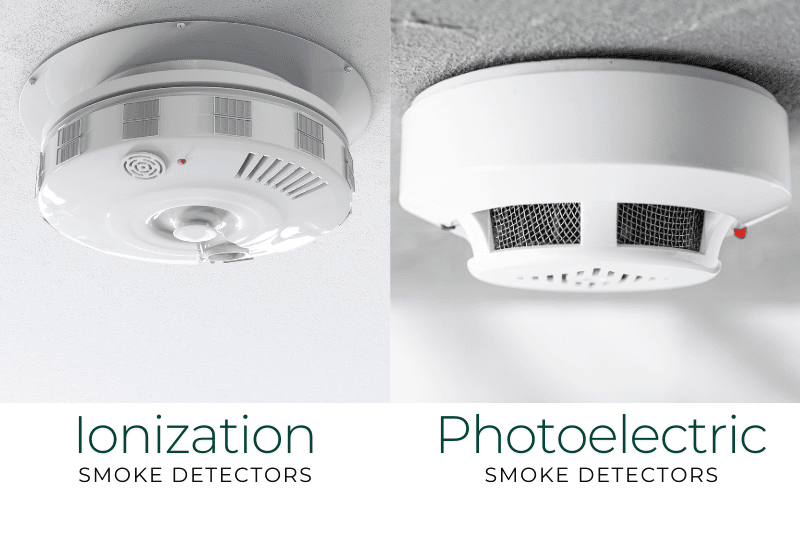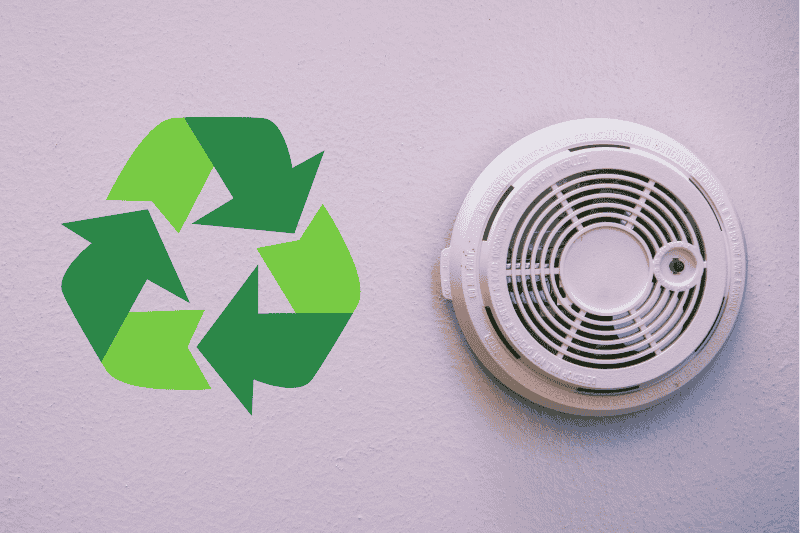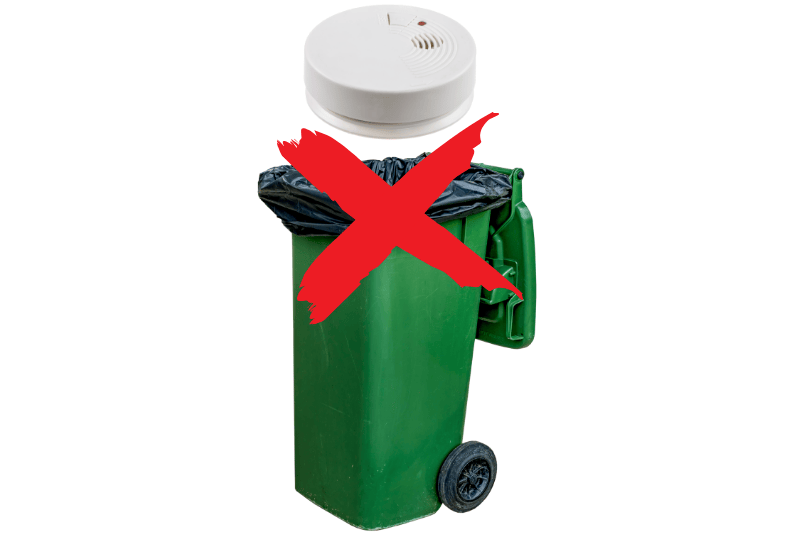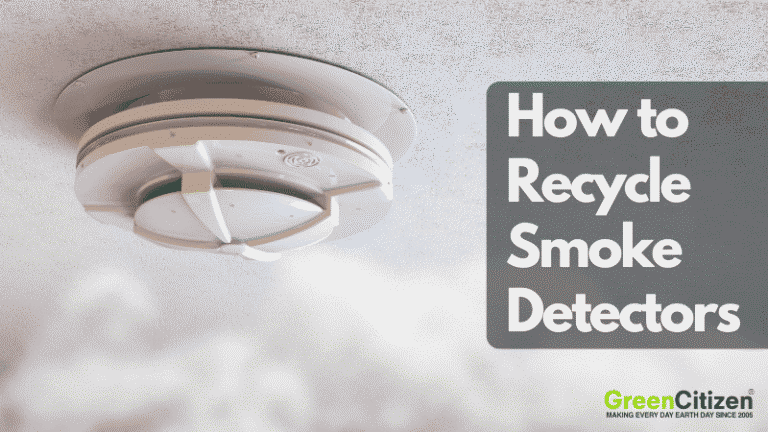Smoke detectors don’t last forever—most expire after about ten years. But when they stop working, what do you do with them? Can you recycle a smoke detector, or just toss it in the trash?
That’s where many homeowners get stuck. The answer depends on the type of smoke alarm you have.
Ionization smoke detectors contain small amounts of radioactive material, requiring careful disposal. Photoelectric smoke detectors and carbon monoxide detectors, on the other hand, contain electronic components that often qualify as e-waste, not regular trash.
In this guide, you’ll learn how to recycle smoke detectors properly, including what’s recyclable, what’s hazardous, and where to take them. Whether you’re replacing one unit or clearing out a dozen, we’ll walk you through safe, legal, and eco-friendly options for smoke detector disposal.
✅ Key Takeaway: How to Recycle Smoke Detectors Safely and Legally
Old smoke detectors aren’t regular trash—they’re a mix of plastic, electronics, and sometimes radioactive material. Whether it’s a smoke alarm or CO detector, the safest option is to recycle it through certified programs or hazardous waste sites. Proper disposal keeps toxins out of landfills and ensures compliance with local waste laws.
Can You Recycle Smoke Detectors?
Yes, some smoke detectors can be recycled—but not through curbside recycling. Ionization smoke detectors contain a small amount of radioactive material, which makes them hazardous waste and not eligible for standard recycling. Photoelectric smoke detectors and carbon monoxide detectors, however, may be accepted at e-waste recycling centers because they contain circuit boards and batteries.
Before recycling, it’s critical to identify the type of smoke alarm you have:
- Ionization smoke detectors often require manufacturer take-back programs or hazardous waste facilities.
- Photoelectric smoke detectors may be dropped off at certified e-waste recyclers.
- Carbon monoxide detectors can sometimes be recycled along with other household electronics.
Always remove any batteries first and check with local authorities before recycling smoke detectors.
Are Smoke Detectors Considered Hazardous Waste?
Some smoke detectors are considered hazardous waste, especially ionization models that contain radioactive material like Americium-241. These detectors can’t be thrown in the trash or sent to regular recycling centers. Instead, they must be handled through certified hazardous waste programs or manufacturer take-back services.
Photoelectric smoke detectors and carbon monoxide alarms are usually not classified as hazardous but may still qualify as e-waste due to their circuit boards, batteries, and sensors.
Improper disposal of either type can result in environmental harm or legal penalties, depending on local regulations.
How to Tell If Your Smoke Detector Is Ionization Or Photoelectric?
Check the label or back of your smoke detector. If it says “ionization” or “contains radioactive material,” it’s an ionization type. If it says “photoelectric” or “optical,” it’s a photoelectric model. Some units are dual-sensor and will be labeled as such.
You can also check the user manual or manufacturer’s website.
Always check the label or back panel of your device before recycling or disposal. The type of detector determines whether it goes to an e-waste facility, take-back program, or hazardous waste site.

Here’s how to identify which type you have—and what that means for safe handling.
1. Ionization Smoke Detectors
Ionization smoke detectors are great at detecting fast, flaming fires. They work by using a small amount of radioactive material, typically Americium-241 (Am-241), as a source of alpha particles.
These particles ionize air molecules, creating positively and negatively charged ions. Inside the detector, two charged plates maintain a constant flow of ions. When smoke enters, it disrupts this flow, triggering the alarm.
- Detects: Fast, flaming fires
- Contains: A small amount of radioactive material (Americium-241)
- How to Identify: Look for labels like “ionization” or “contains radioactive material”
- Recycling Note: Requires special disposal—many brands offer mail-in take-back programs. Otherwise, contact your local hazardous waste facility.
2. Photoelectric Smoke Detectors
Photoelectric smoke detectors are designed to sense slow, smoldering fires. They work by using a light source and a sensor. Inside the detector, a beam of light is aimed away from the sensor. When smoke particles enter the chamber, they scatter the light toward the sensor, triggering the alarm.
These detectors are often called optical detectors because they rely on light technology to detect smoke.
- Detects: Slow, smoldering fires
- Contains: Light-based sensors (no radioactive material)
- How to Identify: Look for terms like “photoelectric” or “optical” on the label
- Recycling Note: Easier to recycle via e-waste centers, but still requires safe disposal of electronics and plastic housing.
3. Dual Smoke Detectors
Some models combine ionization and photoelectric alarms for comprehensive fire detection. These contain a mix of radioactive and optical components. Because of this hybrid design, proper disposal methods depend on the specific type of materials inside. Some even might go to separate recycling program.
- Detects: Both fast and slow fires
- Contains: Radioactive and optical components
- How to Identify: Look for “dual-sensor” or combination labeling
- Recycling Note: These may require hybrid handling—check manufacturer instructions or consult hazardous waste services.
4. Carbon Monoxide or CO Detectors
Unlike smoke detectors, these alarms monitor carbon monoxide, a dangerous gas you can’t see or smell. They often house sensors and electronic components that should not end up in household trash.
- Detects: Carbon monoxide gas
- Contains: Electronic sensors and sometimes batteries
- How to Identify: Labeled as “CO detector” or “carbon monoxide alarm”
- Recycling Note: Treated as e-waste, especially if it contains lithium batteries.
✅ TL;DR: Check for “ionization,” “photoelectric,” or “CO detector” on the label. Ionization models require special handling due to radioactive material; others may be recycled through e-waste programs.
How to Recycle Smoke Detectors (Step-by-Step Guide)
Used smoke detectors should never be thrown in the trash—especially ionization models that contain radioactive material.
Whether it’s an expired photoelectric alarm or a carbon monoxide detector, follow these safe, legal steps to recycle or dispose of them properly.

Step-by-Step Smoke Detector Disposal Guide
Step 1: Identify the Type of Detector
Check the label to determine if you have an ionization, photoelectric, or dual smoke detector. Ionization detectors contain radioactive materials and require extra care, while photoelectric ones are easier to handle.
Step 2: Check Manufacturer Recycling Programs
Some manufacturers, like First Alert or Kidde, offer take-back programs for old detectors. Visit their website or contact customer service for special disposal instructions.
Step 3: Visit Retailers That Sell Smoke Detectors
Stores like Home Depot or Lowe’s sometimes accept old detectors for disposal. Call ahead to confirm if your local store offers this service.
Step 4: Contact Your Local Municipality
Your local municipality might run separate recycling programs or have drop-off points for ionization detectors since they need to be treated as hazardous waste. Check their website or give them a call.
Step 5: Remove Backup Batteries
Before disposing of your detector, take out the backup batteries. These should be recycled separately to prevent fire risks and comply with disposal ordinances.
✅ TL;DR: How to Dispose of Smoke Detectors Legally
Used smoke detectors should never go in the trash. First, check if the unit is ionization, photoelectric, or dual-sensor. Remove backup batteries for separate recycling. Then, use manufacturer take-back programs, local hazardous waste drop-off sites, or ask retailers like Home Depot if they accept them. Always follow local disposal laws for safe handling.
What Not to Do When Disposing of Smoke Detectors
Improper disposal of smoke detectors can cause environmental harm, legal issues, and exposure to hazardous materials. Avoid these common mistakes when getting rid of old or expired smoke alarms.
❌ Top Mistakes to Avoid:
1. Throwing Smoke Detectors in the Trash
Tossing smoke alarms—especially ionization models—into regular garbage is dangerous. They may contain radioactive elements or electronic waste, which can leak into landfills and pollute ecosystems. In some areas, it’s even illegal and could result in fines.
2. Taking the Detector Apart Yourself
Dismantling a smoke detector without proper training risks exposing yourself to Americium-241 or damaging internal components. Even photoelectric or carbon monoxide models contain parts that require special handling or recycling.
3. Ignoring Local Disposal Regulations
Disposal rules vary widely. Some areas classify smoke detectors as household hazardous waste, while others require mail-in recycling. Skipping these steps can lead to improper disposal, environmental violations, or even fines.
Where to Recycle Old Smoke Detectors Near You
You can recycle old smoke detectors through manufacturer take-back programs, hazardous waste facilities, or certified e-waste centers—never in the trash.
Ionization models may contain radioactive material and require special handling, while photoelectric and carbon monoxide detectors can often be dropped off at local recycling programs or retail locations.
1. Manufacturer Take-Back Programs (First Alert, Kidde, Nest)
Many major brands offer mail-in or take-back recycling options:
- First Alert / BRK: Offers a mail-in program for ionization detectors. You must cover shipping costs. Visit their website for instructions.
- Kidde: While Kidde does not currently accept mail-in recycling, they recommend contacting your local hazardous waste facility for ionization models.
- Nest (Google): Some Nest models are eligible for e-waste recycling through your local program—check your device type.
2. Retail Drop-Off Programs (e.g., Home Depot, Lowe’s)
Some retailers accept smoke detectors, especially photoelectric or CO models with electronic components:
- Home Depot and Lowe’s: May accept certain types of smoke alarms or batteries at select locations. Call ahead to confirm participation and limitations.
- Best Buy: While they don’t typically accept smoke detectors, they do accept other e-waste, which may apply to some CO detectors.
3. Local Hazardous Waste Facilities
Your city or county’s household hazardous waste (HHW) program is often the safest place to dispose of ionization smoke detectors, which contain radioactive material. Visit your local government website for drop-off schedules or rules.
4. Use Green Directory
The easiest way to find certified disposal and recycling centers near you is through the Green Directory. Just enter your zip code to locate nearby programs that accept:
- Used or expired smoke detectors
- Carbon monoxide alarms
- E-waste containing circuit boards or batteries
- Radioactive household items
Is It Legal to Throw Away Smoke Alarms?

In most cases, it is not legal—or safe—to throw smoke detectors in the trash. Ionization smoke alarms contain a small amount of radioactive material (Americium-241), which classifies them as hazardous waste in many states. Throwing one in the bin could violate local disposal laws and result in fines or penalties.
Even photoelectric and carbon monoxide detectors, while non-radioactive, often contain batteries, circuit boards, and electronic components that qualify as e-waste. Tossing them in regular garbage contributes to landfill pollution and may break electronic waste regulations, depending on your location.
Before throwing away any smoke alarm, check with your local hazardous waste authority. If improperly disposed, these devices can release toxic components into the environment or pose health risks during incineration or crushing. Always recycle smoke detectors through approved facilities or take-back programs to stay compliant and protect the environment.
How to Dispose of Carbon Monoxide Detectors and Fire Alarms
Like smoke detectors, carbon monoxide (CO) detectors often contain batteries, sensors, and electronic circuits that qualify as e-waste. Some models may also include chemical sensing agents, which require hazardous waste handling in certain jurisdictions. Never throw a CO detector in household trash—recycle it through an e-waste program or hazardous waste facility.
Fire alarms are sometimes confused with smoke detectors, but the disposal rules are similar.
While many fire alarms don’t contain radioactive elements, they still include batteries, circuit boards, or plastic components that don’t belong in landfills. These should also be taken to an e-waste recycling center or returned to a manufacturer if a take-back program is available.
Take Action: Recycle Smoke Detectors the Right Way
Safely disposing of smoke detectors isn’t just about following rules—it’s about protecting the environment and avoiding harmful waste. Whether you’re dealing with ionization, photoelectric, dual-sensor, or carbon monoxide detectors, proper disposal prevents pollution, protects public health, and supports responsible e-waste management.
Remember: never toss smoke alarms in the trash. Use manufacturer take-back programs, hazardous waste facilities, or certified e-waste recyclers to keep hazardous materials out of landfills.
Not sure where to go? Use the Green Directory to find safe, legal recycling options near you—and keep toxic waste out of your community.
